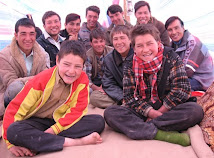Please watch how Afghan youth fasted & asked which other human we humans would torture next
On Martin Luther King’s Day this 18th of Jan, after fasting for 2 short days, in solidarity with Witness Against Torture’s 12 day fast for the prompt closing of Guantanamo Bay Prison, a few Afghan Youth Peace Volunteers gathered in a mud house on an Afghan winter night, to have a heart-to-heart conversation with members of the Witness Against Torture and later, with friends from Landmark Education Olympia facilitated by Dr Dennis Mills of Capella University.
We asked each other the questions of our times and our hearts.
Friends of Witness Against Torture led by Frida Berrigan and Bob Cooke encouraged the Afghan youth with their kind words, their tears and their singing. The conversation ended with them singing ‘We shall overcome’ and a sense of the ‘change in consciousness’ and the friendships which all human beings long for.
We remembered the words of Martin Luther King, in the everyday Dari of Afghanistan.
Text of Video
A few Afghan Youth Peace Volunteers fasted for 2 days, then gathered in the mountains…
Which human will we humans torture next?
They tele-conversed with Witness Against Torture, remembering M. L. King's words
Life's most persistent and urgent question is, 'What are you doing for others?'
A lie cannot live.
At the center of non-violence stands the principle of love.
Love is the only force capable of transforming an enemy into a friend.
Man must evolve for all human conflict a method which rejects revenge, aggression and retaliation. The foundation of such a method is love.
Darkness cannot drive out darkness; only light can do that. Hate cannot drive out hate; only love can do that.
Darkness cannot drive out darkness; only light can do that. Hate cannot drive out hate; only love can do that.
We must learn to live together as brothers or perish together as fools.
Why do we respond to fear, hate and anger by hurting one another?
Frida Berrigan of Witness Against Torture : They first become wealthy professionals but they don’t want to. They want to lower their income because they don’t want to pay for war
Dr Dennis Mills of Capella University
The 3 ( demons ) are racism, materialism & militarism.
Those are very prophetic words because we who are making this call are still working to change ourselves for generations.
ما اسانها کدام انسان دیگر را خواهد شکنجه کردیم؟
Which human will we humans torture next?
Pause in empathy or perish in estrangement
We shall live in peace some day
We shall overcome some day
Now is the time to pause in empathy or perish in estrangement
Cross posted from http://www.witnesstorture.org/fast-day-8
Compiled by Kate Cowley
January 18, 2010
Dear Friends,
Dear Friends,
This morning, on Day Eight of our fast, we gathered together for a conference call with the Afghan Youth Peace Volunteers, a group of young people working for peace and justice in Afghanistan
It is difficult to try to encapsulate the richness of the dialogue we exchanged with this group of young people so dedicated to the struggle for peace and justice, and so entrenched in the sorrow and pain of war. The dialogue and connections across such a distance was very inspiring to all of us.
At one point in the conversation, Jerica mentioned to them that we’ve been singing a lot lately, and asked if they sing songs together. They in turn asked us to sing for them, and so Kathy led us in another round of “Hold on, keep your eyes on the prize.” They returned the favor by singing a song for us in Arabic that translates into English as: “Mountains cannot reach mountains, only men can reach men.”
Carmen brought up that it was Martin Luther King Day and asked if they were aware of the significance of this day in the history of the U.S.
At end the day, we joined with survivors of torture from TASSC International at St. Stephen’s. In sharing their stories with us, they expressed the difficulty of starting life over again after being tortured and re-assimilating to life again in a different place. They focused on the importance of prayer for them, and shared their gratitude at learning that there was a group of people praying with and for them. We listened as they spoke about the effects of certain methods of torture, particularly solitary confinement, and the de-humanizing effect it can have. They also discussed the way violence of torture perpetuates itself, how often the tortured can become the torturer.
They told us that one of the most difficult things about being a survivor of torture is the loneliness. We have talked as a group before about this feeling of loneliness, and how it is one thing that all human beings share. Again and again we come back to this idea of community, of being able to reach out to one another, as a way of rebuilding our humanity.
Thank you for all you are doing.
Peace with Justice,
